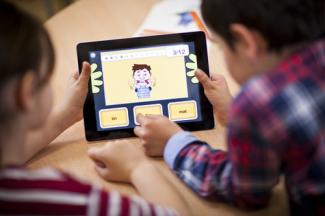
By Kim Ashmore, teacher and writer
Introduction
Learners are often worried about pronunciation, but you do not need to sound like a native English speaker to be able to communicate in English. There are different accents in the United Kingdom and other countries where English is spoken as a first language. English is also widely used in countries like India and Singapore, and is increasingly used as a global language. There are many different varieties of English – you've probably discovered this yourself. Don't worry if your child does not speak with 'perfect' English pronunciation. Let your child play with and discover sounds – this is an important stage in learning languages.
Activities you can do with your child
There are lots of activities you can do with your child to practise pronunciation. Choose the activities that you think your child will like best. Try to make the activities as fun as possible, and stop when your child has had enough.
Here are some ideas for activities:
Songs and rhymes
Songs, nursery rhymes and chants are a great way to introduce younger children to the sounds of English. Many chants and nursery rhymes are repetitive and easy to remember, and your child will not need to be able to read or write English. You'll find some traditional songs and nursery rhymes on LearnEnglish Kids. Listen to the songs, learn them together and sing the rhymes wherever and whenever you like – in the car, on the way to school, at bathtime!
Listening to stories
Listening to somebody reading aloud while following a text is a good way for children to pick up how words sound, and also to learn what words sound like in sentences. If you don't feel confident enough to read aloud to your child then there are stories you can listen to together on LearnEnglish Kids. You could also borrow books with CDs from the library if that's possible, or buy some. Perhaps you could share books and CDs with friends and make your own library?
Games
Say words silently to your child. Can they guess what words you are saying by looking at your mouth? This will make them concentrate on the shapes the mouth makes for different sounds. When your child understands the game, they can silently say some words to you.
Create a character with a name which starts with the sound you want to focus on, like /dz/ which is the sound of the 'J' in 'Jack'. Ask your child to draw Jack and then think of all the things that Jack likes that start with the same sound, for example juggling, jam, Japanese food, etc. Now draw these things around the picture of Jack.
Play a rhyming game by choosing one word, for example, chair. Ask your child to draw the word, and next to the picture write (or draw) words that have the same sound, for example hair, hare, wear, pear.
Tongue twisters
Try some tongue twisters. This can be a fun way to practise sounds with older children. Here are some popular English tongue twisters.
- She sells sea shells on the sea shore
- A proper copper coffee pot
- Around the rugged rocks the ragged rascal ran
- Red lorry, yellow lorry, red lorry, yellow lorry
- A big black bug bit a big black bear
- Peter Piper picked a peck of pickled peppers. Where's the peck of pickled peppers Peter Piper picked?
You can find more tongue twisters on LearnEnglish Kids. Listen to the tongue twisters, and practise saying them. How fast can you say them? You could discuss which sounds are difficult, and which sounds are similar to or different from your first language.